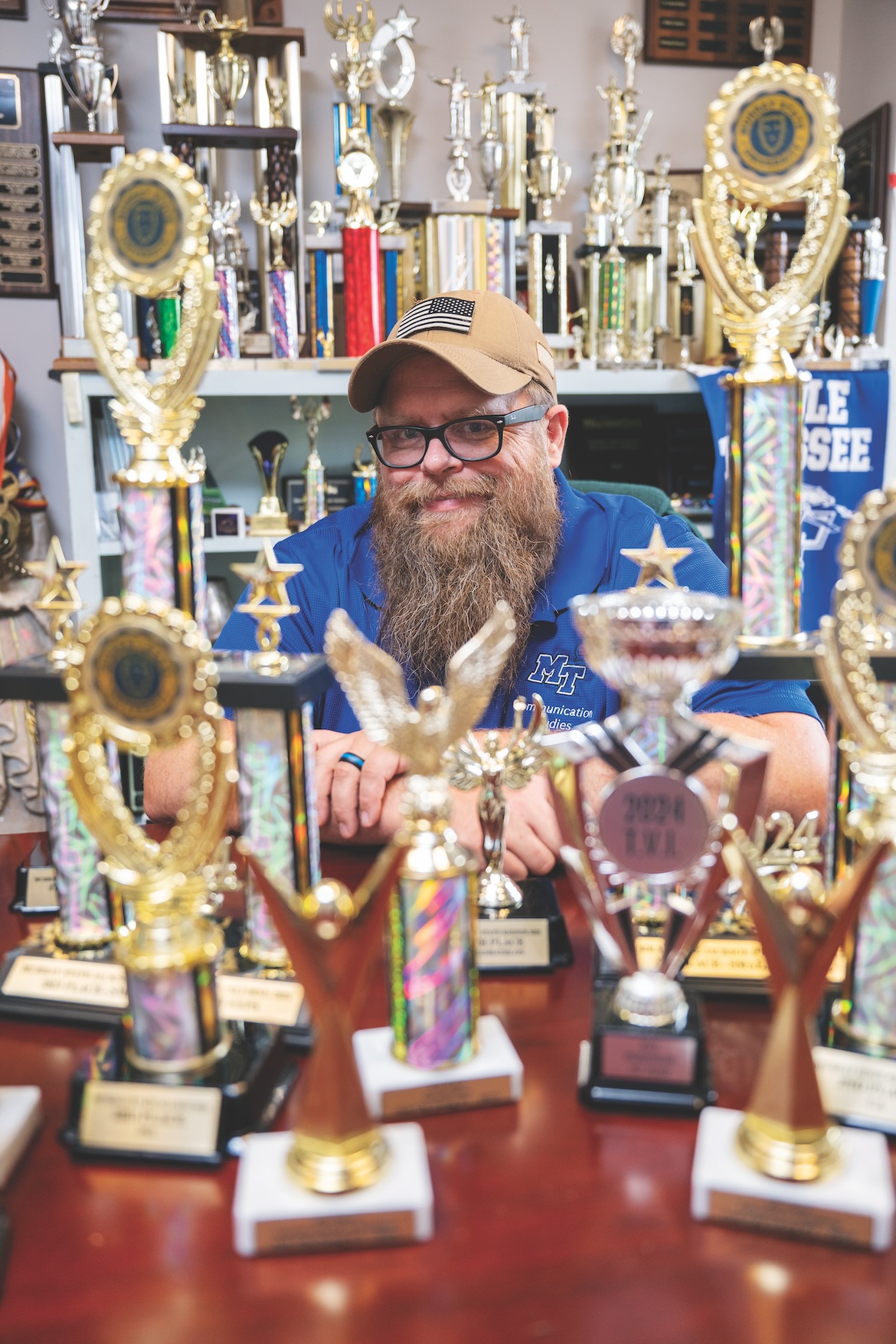
4 minute read
A Winning Argument
MTSU debate coach helps University win 11 national championships
by Skip Anderson and Drew Ruble
The recent presidential campaign cycle showcased how significant the art of debate (or failure at the art of debate) can be in determining public sentiment and political outcomes.
Debate has a proud tradition at MTSU dating back decades. Researching and debating the topic of product safety in 1976–77, the MTSU Debate team contributed significant research and personal testimony to legislators as Tennessee led the nation in passing the first state law requiring children to use child safety seats in automobiles. But the last few years have been nothing short of a Golden Era for MTSU Debate.
Pat Richey, MTSU’s director of forensics and an Honors professor of Communication Studies, has coached the Blue Raider debate team to 11 individual and team national championships since he became the University’s debate coach in 2011.
Despite being outmatched in team size by nearly 4 to 1 compared to many of the schools it competes with, MTSU is a heavyweight in college debate.
“We have real talent in the student population at MTSU,” Richey said. “We can hold our own against flagship institutions.”
Richey acknowledges taking an underhanded approach to their training, in a way.
“When I practice with the students, I use every dirty trick I can think of,” Richey said. “That way I can see them process something unfair happening and see how they're going to respond.”

A “dirty trick” in debate could be as simple as misrepresenting the words the students say.
“So, for instance, I might say, ‘You said this was the case,’ when they clearly didn’t,” he explained.
Richey also reminds his students not to let go of reason by getting dragged into an emotional debate.
“I remind them that it’s not about winning that argument, it’s about convincing the judge with logic that you’re right,” he said. “I also want my students to kill their opponents with kindness. A lot of people will get very upset, and when that happens, they just collapse.”
Richey first became interested in debate in middle school and was on the debate team in high school, b ut his nascent interest hadn’t yet sparked a lifelong passion. After graduation, that changed.
“I joined the Army Reserves, and that put me on a straight track,” Richey said. “I was doing debate in college and about to get out of the military when 9/11 happened.”
The government almost immediately issued a s top-loss order.
“A stop-loss order means they hold onto people with certain skill sets: pilots, medics, special forces, and so forth. As a result, I spent nine years in the military on a four-year contract,” he said.
I was doing debate in college and about to get out of the military when 9/11 happened.
As a civil affairs sergeant, his skills were in demand. Attached to the 4th Infantry Division out of Tikrit, R ichey served in Iraq during the invasion and the following year. Civil affairs officers are responsible f or serving as a liaison between a “host community” and the military.
“Before and during a war, we make sure civilians are off the battlefield, and we mark the heritage sites. After conflict, we help rebuild. In Iraq, we had a tough task as there was very little infrastructure left—no water, no electricity, and very little sanitation,” Richey said.
Being deployed in a war zone largely meant that h e wasn’t able to do a lot of formal debating. H owever, there was one notable exception.
“While I was in Iraq, I was in an online debate,” he said. “I debated for the fictitious University of Baghdad, a nd I ended up winning it. We did that via satellite; t his was long before smart phones.”
The world has changed a lot since then. But Richey’s love of debate has not.
Highly recognizable at college debate events because he wears a cowboy hat during competition, Richey h as led his undermanned Blue Raider debate team to national prominence in shootouts of words and logic.










